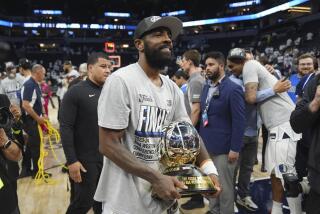Why We Admire the Playoffs’ Little Big Man
- Share via
He was there on Figueroa Street for the parade honoring his heroes Monday, and he’s not about to take the Kobe Bryant poster down from his bedroom wall. But there’s a new tug on his suburban 10-year-old heart; you can see it as plain as the hair on his head.
His afro--so proudly grown and tended since last year, when Kobe and company brought their first trophy home--is now braided to his head in neat rows. And decorating his arms, neck and chest are ink-pen etchings that I cannot read but do not fail to recognize.
The Lakers’ NBA victory was hard-fought and well-deserved. The talk of a dynasty is sweet. So why does it seem that, for many of us, the most enduring memories from the playoffs revolve around a scrappy little point guard from the losing team?
Some of Allen Iverson’s appeal is simple: We like to root for the underdog. He was the tiniest, toughest man on the court, leading a crew of injury-plagued teammates through valiant battle against the game’s most talented team. But some of what makes him so memorable is less about sports than about culture--our longings and his humanity.
What to make of a man who wears a “What Would Jesus Do?” bracelet strapped around an arm studded with tattoos? How to explain our conflicting emotions--we berate him for the obscene lyrics in his rap CD, but our hearts melt when we watch him plant a kiss on his 6-year-old daughter during halftime of the championship game?
For every perception that tells us who he is, there is a counter-impression borne of who we are: Is he an example of heroic redemption, rising above life’s hard knocks and his own mistakes? Or is he a brash and unrepentant hood, mocking convention and respectability? Do we laud him for bringing authentic dignity to an urban culture starved for heroes? Or do we chide him for his thug appeal, for glamorizing a lifestyle that dooms some and frightens others?
He is not your father’s basketball star. You won’t find him on the links in the off season or hosting a talk show on late-night TV. He made NBA officials so uncomfortable that they once airbrushed his tattoos from his picture on the cover of a magazine.
But it is not so easy for the rest of us to brush away our unease. Kids everywhere who no longer want to “be like Mike” have forced us to take note, to step outside our comfort zone and figure out who this Iverson is.
And what we discover can do more to break down barriers between young and old, urban and suburban, black and white than an endless series of pickup games.
As Milwaukee Bucks coach George Karl told a reporter, after his team was vanquished by Iverson’s: “I don’t know what he does off the court
The first time I watched him play, I knew nothing of Iverson beyond his talent and tattoos ... and the popularity of his basketball shoes. I had heard one sportswriter say that he was the most fun player to watch in a game but the last guy you’d want your daughter to marry.
I watched him take a blow to his injured shoulder--a calculated, flagrant foul--that sent him flying across the floor. I prepared for the explosion I was sure would follow, the retaliation that seemed to suit his take-no-prisoners rep and playing style.
He grimaced ever so slightly, then leaped to his feet and headed back down the floor. He stood at the foul line, shook off the pain, and launched two perfect free throws. A smile, a fist pumped in the air, then back down the court and on with the game. And that undaunted spirit showed itself again and again.
And I realized then why I like him so much: Because the lessons in the way he plays transcend the sport of basketball, are as much about life as about a game.
You face a challenge head-on. You get knocked down, you get up. You keep your eye on your goal. You don’t alibi, don’t whine. You play as hard as you can every minute, every game. You rely on guts, not just talent, to carry the day. And you grow up along the way.
I think about him as I sit on the bleachers in a sweaty gym, watching a skinny little point guard--my 10-year-old daughter--bring the ball downcourt in a practice game.
She is typically skittish and shy, playing against girls who tower over her. But on this night, she bulls through the crowd, gets knocked to the floor but holds on to the ball. Later, she tells me that it hurt but that she will not be afraid next time. “It doesn’t matter if they’re all bigger than me.”
And I see a champion in her tiny frame. Iverson may not be the guy I want her to marry, but I sure won’t mind having his picture on her wall
More to Read
All things Lakers, all the time.
Get all the Lakers news you need in Dan Woike's weekly newsletter.
You may occasionally receive promotional content from the Los Angeles Times.







